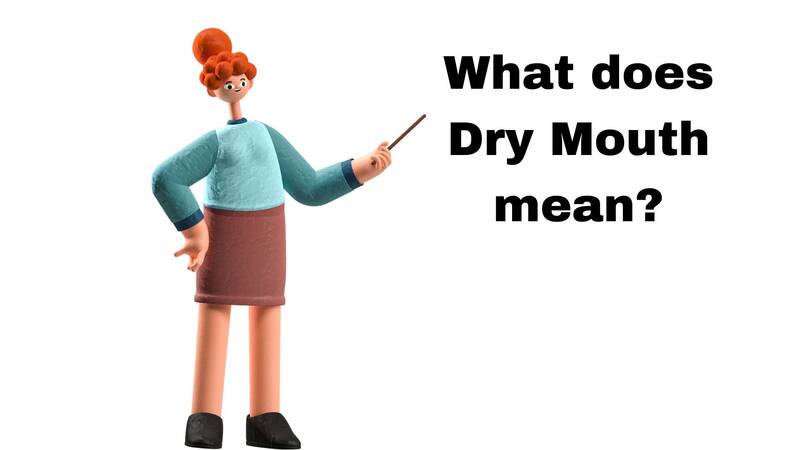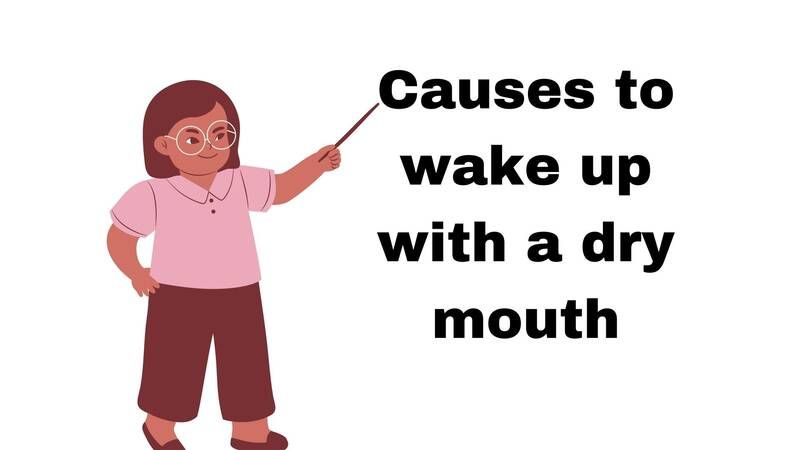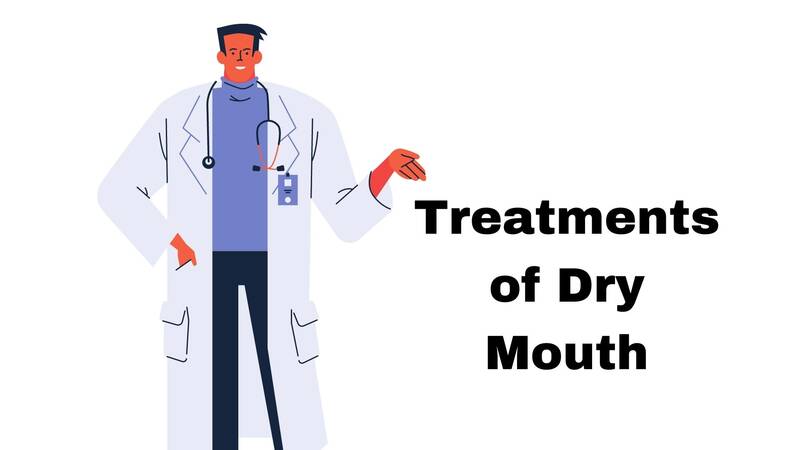It is pretty uncomfortable to wake up in the early morning with a dry mouth, and it can even indicate some severe health issues.
Therefore, it is vital to identify the root cause of waking up with dry mouth to understand the precautionary steps you should take.
There would be times when you might be able to prevent or treat dry mouth, and the leading cause in a few cases proves fatal.
So, how can I stop waking up with dry mouth? There are ways in which dry mouth can be relieved even if you cannot eradicate it.
Contents
What dry mouth means?

Xerostomia is the medical terminology for dry mouth. It occurs when you wake up with dry eyes and the mouth lacks saliva since the glands are not producing it sufficiently.
It is known as hyposalivation.
The following are the reasons for the importance of saliva:
- It helps to kill bacteria
- It cleanses your mouth
- It helps to wash away the food you eat
The symptoms of dry mouth are as follows:
- A mild to severe sore throat
- Burning sensation in your mouth
- Hard to swallow
- Speaking difficulty
- Hoarseness
- Dryness in your nose and nasal passages
The following are the outcomes of dry mouth:
- Bad nutrition
- Dental difficulties, such as gum disease, tooth loss, and cavities
- Psychological disorders
- An impaired sense of taste
Dry mouth can take place due to several different factors.
A few factors may constantly lead to waking up with dry mouth due to dehydration, while there are other factors where the dry mouth is temporary.
Causes to wake up with a dry mouth

1. Mouth breathing
The underlying cause of waking up with a dry mouth can be your sleeping habits. If you sleep with your mouth open, you can experience a dry mouth.
The following are the causes:
- Habit
- Clogged nasal passages
- Some other health conditions
- Snoring and obstructive sleep apnea
According to a study, it is found that about 16.4 percent of 1000 people who snored and 31.4 percent of those having obstructive sleep apnea have experienced dry mouth on waking up. About 3.2 percent of people without such conditions were reported to have a dry mouth.
Additionally, individuals with more severe obstructive sleep apnea conditions were more likely to be experiencing dry mouth than people with milder symptoms.
The study checked the effects of dry mouth on people who were recently screened for sleep apnea-hypopnea syndrome.
Hypopnea is mainly distinguished by shallow breathing, while apnea causes breathing to stop entirely.
2. Medications
Medications are distinctively the cause of dry mouth. Several of them might be causing this, and the following are included:
- Sinus conditions
- High blood pressure
- Mental health conditions, such as anxiety or depression
- Parkinson’s disease
- Sleep conditions
- Nausea and vomiting
- Diarrhea
- Overactive bladder
- Allergies
- Nerve pain
You might be developing chronic dry mouth if you should take medications such as these for managing an acute health condition.
You are also susceptible to dry mouth if you are consuming several medications at a single time, which is why I am waking up with dry mouth.
It is essential to speak with a doctor about how you can relieve dry mouth following your medication regime.
It can also be possible for you to shift while consuming the medications to avoid waking up with a dry mouth.
The doctor will also identify and prescribe other medications that will not cause a dry mouth.
3. Aging
You can also experience dryness more frequently while you are aging.
You can be one of the 30 percent of adults, mainly over the age of 65 years, or nearly 40 percent of adults over 80 years under this condition.
The aging in itself may not cause a dry mouth, and dry mouth can be the outcome of the medications you are taking for managing some other health conditions.
A few conditions would also be causing dry mouth, including diabetes, Parkinson’s disease, and Alzheimer’s disease.
4. Diabetes
If you have diabetes, there are many reasons you might be experiencing dry mouth.
If your blood sugar levels are constantly high or you are dehydrated, you may experience this condition. Dry mouth can also occur due to the medications that you are consuming.
Taking steps to manage your diabetes can help reduce having a dry mouth. You should consult with your general physician about the medications you are consuming to check if lowering the intake of drugs can help your dry mouth condition.
5. Alzheimer’s disease
Alzheimer’s disease can obstruct your ability to hydrate yourself or communicate with someone else that you need fluids such as water.
It leads to dehydration, causing dry mouth in the morning.
Dry mouth can also be partnered by:
- dizziness
- an increased heart rate
- delirium
People with Alzheimer’s disease may face dehydration causing more visits to the emergency rooms and getting admitted into the hospital.
You need to drink plenty of water to avoid getting dehydrated. Encourage people to drink water throughout the day if you care for someone with Alzheimer’s disease.
Always be mindful that the weather or indoor environment changes can increase the amount of water you intake.
6. Sjögren’s disease
The autoimmune disease affecting your connective tissue and glands near your eyes and mouth is Sjögren’s disease.
The primary symptom of this health condition is the cause of dry mouth, and the condition mainly affects people experiencing menopause.
Your doctor will be working with you to help manage your symptoms, although there is no cure for autoimmune disease.
Alongside Sjögren’s disease, other immune disorders such as lupus and rheumatoid arthritis may occur.
7. Cancer therapy
Dry mouth is also caused due to the treatment for head and neck cancers.
Your salivary glands get damaged permanently due to radiation directed at your head and neck, leading to a dry mouth in the long term.
Chemotherapy can also cause dry mouth temporarily.
It can occur immediately after starting cancer treatments, or this condition might develop for months and even years.
8. Tobacco and alcohol
You will be experiencing dry mouth after the use of tobacco or alcohol.
Alcohol can be dehydrating as it is acidic, leading to dry mouth and issues with your teeth.
You may even be experiencing dry mouth after mouthwashes that have alcohol in them.
Your salivary flow rate can be altered by tobacco affecting your oral health.
It was noted in a study mainly in those who smoked, leading to being subjected to the risks of:
- cavities
- gum disease
- loose teeth
9. Recreational drug use
Dry mouth is caused due to heroin, methamphetamine, and ecstasy.
The drugs will affect the flow of saliva in your mouth, such as tobacco.
The use of substances will also affect your oral health and your ability to practice excellent oral hygiene.
Methamphetamine is explicitly quite acidic, leading to instant tooth decay.
Prevention
So, how to fix waking up with dry mouth? If you wish to prevent dry mouth at night, you can try out several home remedies if you are at risk.
-
Drink Plenty of Fluids
Drinking sufficient fluids will help you reduce discomfort if your mouth is dry, mainly due to dehydration.
Additionally, drink water the entire day, and keep a glass of water next to your bed during the night.
This way, you will be able to stimulate saliva production before bed by chewing sugar-free gum and using a non-alcoholic mouthwash.
-
Use of Humidifier
A dry mouth can worsen while you are in an environment with low humidity levels. Using a humidifier at night can help prevent the bedroom air from drying.
-
Quit Smoking
Smokers mainly generate less saliva; therefore, quitting smoking would reduce your chances of experiencing dry mouth at night.
-
Address Mouth Breathing
You can reduce your dry mouth by treating your nasal congestion to adjust to your CPAP setups, such as adding a humidifier to your devices by consulting with your doctor if you are breathing through your mouth at night due to the CPAP therapy or blocked nose.
-
Review Medications
So, how can I stop waking up with dry mouth? You need to check your supplements, prescription drugs, and even over-the-counter medications you take to see if xerostomia or dry mouth is enlisted as potential side effects. Never stop consuming it right off if dry mouth is the side effect of the medication you are taking.
They will also determine if you can reduce the medication dosage safely, change your medicinal schedule, or discontinue medication to reduce dryness in the mouth at night.
Read– How Much does Facelift Cost?
Treatments

You can surely come across several strategies to treat dry mouth as it depends on the leading cause of how to prevent dry mouth while sleeping.
-
Artificial Saliva
Research demonstrates that saliva substitutes relieve dry mouth in people who will not be able to find relief with the other methods.
Artificial saliva or saliva substitutes are mainly lubricants that specifically take the form of a mouthwash or gel.
There are a few kinds of artificial saliva that work better than the rest; therefore, it can be helpful to get a recommendation from your doctor familiar with the distinguishing factors of the different kinds.
-
Medication
The salivary stimulants designed to treat dry mouth in people with certain medical conditions are approved by the FDA or the U.S. Food and Drug Administration.
According to evidence, it is also suggested that amifostine medication is often prescribed for diminishing the side effects of chemotherapy reducing dry mouth that comes with radiation therapy.
The drugs have their adverse effects, and you should consult with your doctor before undertaking a new medication.
A few health professionals believe that acupuncture may be able to treat dry mouth at night with the stimulation of the production of saliva.
However, a lot of research is required to confirm this theory.
When to see a doctor
You need to speak to your doctor if your dry mouth is severe and frequent.
They would wish to diagnose the leading cause behind dry mouth by recommending the right kind of treatment plan.
Always look out for ulcers, discolored patches, and gum or tooth decay in the mouth if any oral symptoms of yours are associated with dry mouth.
You doctor would do the following as their mode of screening a patient:
- Reviewing a physical symptom includes looking in your mouth for saliva output, gum and tooth decay, sores, and other conditions.
- knowing about your medical history
- requesting a biopsy for a blood sample
- measuring the amount of saliva you generate
- conducting an imaging test for checking out the salivary glands
- reviewing the prescription medications, remedies, and supplements
- asking about whether you use any recreational drugs or smoke
Read– Crackling Sound In-Ear
FAQs
Below we share some FAQs related to the Waking Up with Dry Mouth.
1. What is indicated by waking up with dry mouth?
Your morning dry mouth happens because of inadequate saliva production, a condition called xerostomia.
Saliva keeps your mouth moist, but it’s also antibacterial, keeping your mouth clean.
2. Waking up at 3 am with a dry mouth?
It is a complete sleep disorder affecting your ability to breathe properly while asleep.
It is pretty tough to fall into a deep, restful sleep while you do not breathe well during sleep.
3. When should you be concerned with dry mouth?
It is pretty normal to have a dry mouth occasionally if you feel nervous or dehydrated, but a dry mouth can persistently be a sign of an underlying issue.
You should check out with your general physician or dentist if you have a thirsty mouth so that they can try to determine the cause.
4. Is dry mouth associated with the symptoms of diabetes?
Both dry mouth and diabetes are linked since diabetes causes reduced saliva generation. About 40-80% of people with diabetes reported having dry mouth symptoms.
5. What causes a throat and dry mouth at night?
One of the common reasons for dry mouth at night is breathing or snoring through the mouth since your nasal passages are inflamed or clogged using mouthware such as dental retainers or bite splints or using a CPAP machine due to sleep apnea.
6. Reasons for being thirsty in the middle of the night?
The reason behind you waking up thirsty at night is that you are dehydrated. Unfortunately, several people are not aware of the amount of water they would need throughout the day to stay hydrated.
7. Can the Stomach issue cause dry mouth?
Gastroenteritis or food poisoning causes vomiting and dry mouth.
8. What diabetic thirst feels like?
You will likely be urinating more and have a higher urine volume as it uses up more water in your body.
Water is also pulled out from your tissues to get rid of the excessive sugar.
9. What are the symptoms of COVID-19 in the mouth?
An altered or lost sense of taste, dry mouth, and sores are considered standard in COVID-19 patients, and these symptoms are longer lasting after others vanish.
10. Will my dry mouth go away?
The dry mouth goes away when this treatment stops. The conditions would be affecting the salivary glands causing dry mouth, such as Sjögren’s syndrome, which is lifelong.
The Concluding Thoughts
There are several reasons why waking up with dry mouth happens to people.
Your medications, sleeping habits, or the root condition may cause your mouth to dry.
Speak with your physician to find out why you get dry mouth if you are concerned, as they would be recommending a treatment plan that will meet your medical requirements.
Read– Does Nutritional Yeast Go Bad?
- Understanding HIPAA Compliance: Obligations for Covered Entities and Business Associates - April 23, 2024
- Things to Invest in for the Easter Season in 2024 - March 29, 2024
- Why Experience Matters: Finding An Established Dental Implants Provider - March 29, 2024
